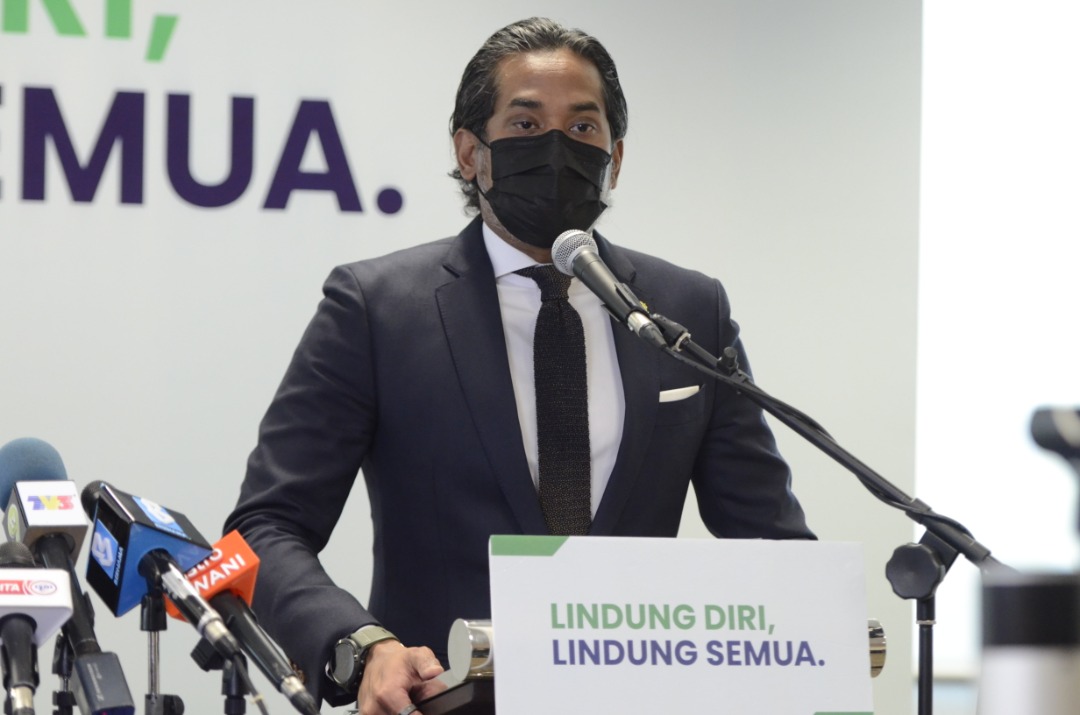KUALA LUMPUR, June 17 — Khairy Jamaluddin has stopped trying to achieve “herd immunity” from Covid-19, a major shift in the government’s thinking, saying instead that he plans to vaccinate the country as widely as possible.
The coordinating minister of the National Covid-19 Immunisation Programme (PICK) expects Covid-19 to be an endemic disease that remains ever present in Malaysia, amid the spread of more contagious new variants, but as a less dangerous threat.
“I’ve stopped using that term,” Khairy said at The Oxford and Cambridge Society Malaysia’s “The Path to Herd Immunity” discussion held online yesterday, referring to “herd immunity”.
“I’ve advised the prime minister to be careful to use the term ‘herd immunity’, simply because my view as the coordinating minister, looking at the data and the science, is that this very well may be endemic and we may see Covid-19 in a less threatening form, but it will stay with us for quite some time.”
The objective of PICK, he said, is to maintain the health care system by vaccinating frontline health care workers, to protect high-risk groups from death and severe disease from Covid-19, to vaccinate 80 per cent of the population as part of the National Recovery Plan, and to manage areas with high Covid-19 transmission. The 80 per cent vaccination goal was not described in Khairy’s slides as a target herd immunity threshold.
The New York Times reported last month public health experts as saying that herd immunity — a point when enough people gain protection either through natural infection or vaccination that the virus can’t find anyone to infect — is not likely achievable and that the coronavirus will probably continue circulating in the United States for years, but as a manageable threat with much fewer hospitalisations and deaths.
Dr Anthony Fauci, US president Joe Biden’s top adviser on Covid-19, reportedly said the US has “stopped using herd immunity in the classic sense”, amid public misperception that infections won’t drop until the US reaches the “mystical level of herd immunity, whatever that number is”.
“I’m saying: Forget that for a second. You vaccinate enough people, the infections are going to go down,” Dr Fauci was quoted saying.
Khairy said while the current focus on mass inoculation is crucial, he described vaccines as just “one tool in an arsenal of measures” required to effectively deal with Covid-19.
He also said apart from adopting a more cautious stance on removing non-pharmaceutical interventions such as wearing masks and ensuring physical distancing in public — compared to countries like the US that has lifted mask mandates for fully vaccinated people — the government is also making inroads into making Covid-19 test kits easily available.
“What the world will look like, or what Malaysia will look like in 2022, is a mixture of people who have been fully vaccinated as well as [the availability of] rapid test kits that can be used on a daily basis, and I think we need to introduce that as part of our lives.
“Just like taking your temperature, doing a quick saliva test — we’re talking to Singapore and seeing how we can work together with them to develop the breathalyser test or whatever that allows you to test quicker and faster than the RT-PCR gold standard — is crucial,” he said.
The science, technology and innovation minister said Malaysia is also leveraging its ties with Pfizer Inc by gaining access to the US drugmaker’s clinical trials and data on Covid-19 treatment. “We’ll be looking at that as well as that is also something required in our arsenal.”
Malaysia is also working alongside a university in Thailand to develop an mRNA vaccine not just for Covid-19, but other tropical infectious diseases as well to boost Malaysia’s end-to-end vaccine manufacturing and development capacity, Khairy said.
“This whole experience has taught me that we need to spend a lot more money on epidemic or pandemic preparedness going forward because not if, but when, there is another epidemic or pandemic — I think there is a lot of data on various zoonotic viruses waiting to jump to the animal ecosystem to human beings — we need to be more nimble and self-sufficient,” he said.
“If I have to repeat this exercise and scramble to talk to Pfizer and get behind in queue, it’s going to be bad for our country.”
The federal government has bought enough Covid-19 vaccines to cover 130 per cent of Malaysia’s 32.7 million population. Khairy described the extra doses as buffer stock that can be given as booster shots to fully vaccinated people, should the virus persist circulating in Malaysia.
“Going forward, if the mutation continues to be aggressive and stubborn, and this ends up becoming endemic, then we need a strategy much as we have for flu shots. That is where the government will have to sit down and decide on a procurement strategy,” he said.
Khairy said the government may have to consider subsidising or providing free doses for 80 per cent of the population — low-income earners and the middle class — for these Covid-19 booster jabs, while allowing the private sector to sell the shots to people who can afford it.
“I suspect [by then], vaccine prices will also drop as we see many more vaccines coming to the market. There are many more vaccines in development and I think this will cause the price of the vaccines to drop significantly. I think when that happens, the private sector and state governments can buy it and it will become just another version of paracetamol, essentially.”








